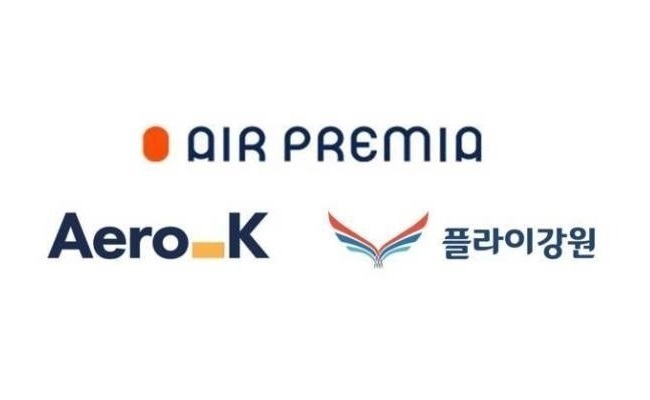Infant LCCs left out from state support fear business collapse
By Kim Da-solPublished : April 27, 2020 - 16:53

The South Korean government has been spewing out financial support schemes for the struggling airline industry upon the novel coronavirus pandemic since February.
But the measures exclude minor and infant-stage low-cost carriers that had acquired their operation licenses only last year, stoking concerns over their business outlook. It also rekindled criticisms that the Transport Ministry had hastily handed out licenses for the already-crowded LCC sector.
Most recently last week, the government announced a plan to inject 2.9 trillion won ($2.3 billion) to help Korean Air and Asiana Airlines stay afloat.
The Korea Development Bank and the Export-Import Bank of Korea said they will inject 1.2 trillion won and 1.7 trillion won into Korean Air and Asiana Airlines, respectively.
As for the country’s seven LCCs, the government had announced in February a combined 300 billion won.
As of April, of the 300 billion won, 54.4 billion won has been given to Asiana Airlines’ budget carriers Air Seoul and Air Busan, 30 billion won to Jin Air, 40 billion won to Jeju Air and 6 billion won to T’Way, according to industry sources.
But industry insiders have voiced concern that the LCCs should be given more support, as their financial situations are less stable and expected to deteriorate over the COVID-19 outbreak.
According to industry data, the largest LCC Jeju Air’s debt ratio more than doubled from 170 percent in 2018 to 351 percent last year. Air Busan reported an eightfold increase in debt ratio from 99 percent in 2018 to 812 percent last year. Jin Air and T’Way both reported three to four times jumps in their debt ratios over the same period.
Even worse are the situations faced by the three youngest air carriers, which received the license on March 5 last year.
The Transport Ministry had received license applications from five potential operators in November 2018 and decided on three new airlines.
They are: Fly Gangwon, which was launched with funds from various capital sources to activate the use of Yangyang International Airport; Air Premia by Seouleaguer which holds the largest 9.53 percent stake; and Aero K, which is a wholly owned subsidiary of Air Innovation Korea.
At the time of the decision, the aviation industry had rosier prospects, with airlines having enjoyed a business boom until late 2018.
The ministry had explained that each new LCC targets different regions and routes and therefore posed minimal risks to overcrowding the LCC market.
But the airline industry, already hurt by the downward travels last year from diplomatic rows with Japan, faced a starkly changed situation this year with the unprecedented pandemic.
Even though the government set out to help the struggling industry, the three newest airlines have been excluded from the recent government support, as they failed to meet the criteria to receive funds, with less than three years of service operation.
Fly Gangwon, which launched its service in November, has been struggling to secure capital through self-rescue plans such as via paid leave for all employees and increasing capital by issuing new stocks worth 16.4 billion won.
Air Premia and Aero K were set to launch their services within this year.
“It is not an exaggeration that the air carriers that have just received the license last year may end up not being able to fly a single flight over deteriorating industry situation over COVID-19,” an industry insider told The Korea Herald.
“(The air carriers’) survival is now dependent on the government’s additional support program for the ailing air carriers,” she added.
Despite the LCCs’ hope for the government’s release of additional support, the state-run KDB Vice President Choi Dae-hyun said there is “no additional support measures planned for LCCs as of now,” during a press briefing held Friday.
Meanwhile, some experts pointed out that the government’s financial support may accelerate restructuring of the competitive LCC market.
Easter Jet, acquired by fellow LCC Jeju Air at 54 billion won last month, had to ground all flights last month over COVID-19. As the merger and acquisition process was still underway, it was not eligible for government support.
To stay afloat, Easter Jet has cut back its workforce by 22 percent, or 350 people. Jeju Air is expected to complete the M&A process with capital secured via government funding.
The possibility of the resale of Air Busan and Air Seoul has also been continuously mentioned since Asiana Airlines was sold as a whole by local builder HDC Hyundai Development.
HDC has planned to complete the takeover by the end of this month, but industry sources said that Asiana‘s increased debt amid low sales over COVID-19 may push back the payment and deal-closing schedule.
By Kim Da-sol (ddd@heraldcorp.com)



















![[Today’s K-pop] BTS pop-up event to come to Seoul](http://res.heraldm.com/phpwas/restmb_idxmake.php?idx=642&simg=/content/image/2024/04/17/20240417050734_0.jpg&u=)